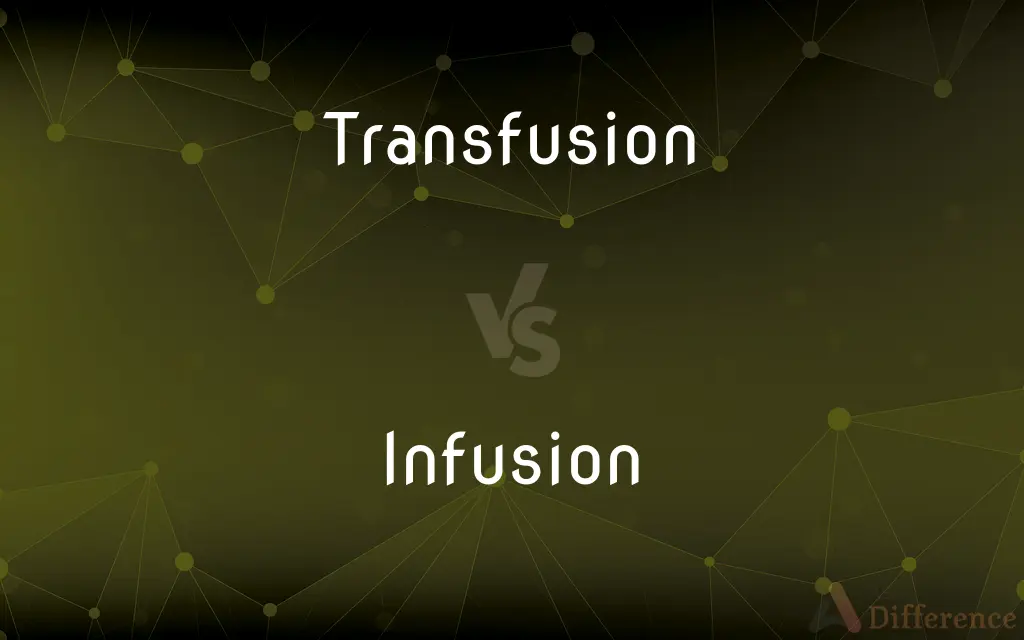Transfusion vs. Infusion — What's the Difference?
By Tayyaba Rehman — Updated on October 9, 2023
A transfusion involves introducing blood products into a person, while an infusion introduces liquids like medications or nutrients.

Difference Between Transfusion and Infusion
Table of Contents
ADVERTISEMENT
Key Differences
A transfusion specifically refers to the process of transferring blood or blood products from one person (donor) to another (recipient). This procedure is crucial in various medical situations, such as surgeries, trauma, or conditions like anemia. On the other hand, an infusion is a broader term that denotes introducing a liquid substance directly into a person's vein. It can include fluids, drugs, or nutrients.
Transfusions are primarily known in the context of blood donation. When a person loses a significant amount of blood or has a disorder affecting their blood, they may require a blood transfusion. In contrast, infusions are used in many medical contexts. For instance, when a patient needs IV antibiotics, it's delivered through infusion.
Safety is a paramount concern with transfusions. It's essential to match the correct blood type and screen for infectious diseases. With infusions, the primary concerns are about dosages, potential allergic reactions, or complications from the infused substances.
Both transfusions and infusions use intravenous (IV) lines for delivery. However, while transfusions exclusively deal with blood products, infusions can involve a myriad of substances, including saline solutions, chemotherapy drugs, or even vitamins.
Comparison Chart
Primary Use
Transfer of blood products
Introduction of fluids, drugs, or nutrients
ADVERTISEMENT
Common Context
Blood donation, surgeries, trauma
Medical treatments, hydration, nutrition
Concerns
Blood type matching, infectious diseases
Dosages, allergic reactions, type of substance
Delivery
Intravenous (IV) line
Intravenous (IV) line
Substance Involved
Blood or blood products
Various, including saline, drugs, and vitamins
Compare with Definitions
Transfusion
A medical procedure to replenish blood.
A transfusion saved the accident victim's life.
Infusion
Introduction of a liquid, usually via IV, into the body.
The doctor ordered an infusion of saline for hydration.
Transfusion
Treatment for conditions like anemia or trauma.
Due to severe anemia, she received a transfusion.
Infusion
A method of administering fluids or nutrients.
The patient was on a nutrient infusion due to malnutrition.
Transfusion
The process of transferring blood or blood products.
The patient needed a transfusion after the surgery.
Infusion
The process of delivering medications directly into a vein.
He received a chemotherapy infusion at the hospital.
Transfusion
Introduction of donated blood into a recipient.
The transfusion process requires strict safety protocols.
Infusion
Infusion is the process of extracting chemical compounds or flavors from plant material in a solvent such as water, oil or alcohol, by allowing the material to remain suspended in the solvent over time (a process often called steeping). An infusion is also the name for the resultant liquid.
Transfusion
Transfer of blood components like plasma or platelets.
The hemophiliac patient required a platelet transfusion.
Infusion
The act or process of infusing.
Transfusion
The act or process of transfusing.
Infusion
Something infused or introduced
An economy in need of regular capital infusions.
Transfusion
(Medicine) The transfer of whole blood or blood products from one individual to another.
Infusion
The liquid product obtained by infusing
Prepared an infusion of medicinal herbs.
Transfusion
(medicine) The transfer of blood or blood products from one individual to another.
Infusion
Introduction of a solution into the body through a vein for therapeutic purposes.
Transfusion
The act of pouring liquid from one vessel to another.
Infusion
The solution so introduced
A sucrose infusion.
Transfusion
The act of transfusing, or pouring, as liquor, out of one vessel into another.
Infusion
A product consisting of a liquid which has had other ingredients steeped in it to extract useful qualities.
An extract of rooibos and chamomile makes a refreshing infusion.
Transfusion
The act or operation of transferring the blood of one man or animal into the vascular system of another; also, the introduction of any fluid into the blood vessels, or into a cavity of the body from which it can readily be adsorbed into the vessels; intrafusion; as, the peritoneal transfusion of milk.
Infusion
The act of steeping or soaking a substance in liquid so as to extract medicinal or herbal qualities.
Transfusion
The introduction of blood or blood plasma into a vein or artery
Infusion
The act of installing a quality into a person.
Transfusion
The action of pouring a liquid from one vessel to another
Infusion
(obsolete) The act of dipping into a fluid.
Infusion
(medicine) The administration of liquid substances directly into a vein for medical purposes; perfusion.
Infusion
The act of infusing, pouring in, or instilling; instillation; as, the infusion of good principles into the mind; the infusion of ardor or zeal.
Our language has received innumerable elegancies and improvements from that infusion of Hebraisms.
Infusion
That which is infused; suggestion; inspiration.
His folly and his wisdom are of his own growth, not the echo or infusion of other men.
Infusion
The act of plunging or dipping into a fluid; immersion.
Infusion
The act or process of steeping or soaking any substance in water in order to extract its active principles.
Sips meek infusion of a milder herb.
Infusion
A solution obtained by steeping or soaking a substance (usually in water)
Infusion
The process of extracting certain active properties (as a drug from a plant) by steeping or soaking (usually in water)
Infusion
(medicine) the passive introduction of a substance (a fluid or drug or electrolyte) into a vein or between tissues (as by gravitational force)
Infusion
The act of infusing or introducing a certain modifying element or quality;
The team's continued success is attributable to a steady infusion of new talent
Infusion
A liquid extract, as of tea or herbs.
She made a herbal infusion to soothe her throat.
Infusion
Continuous introduction of a solution.
The infusion pump ensured a steady delivery of the drug.
Common Curiosities
Why might someone need a transfusion?
A person might need a transfusion due to blood loss, surgeries, or blood disorders.
How is safety ensured in transfusions?
Transfusion safety involves blood matching and screening for diseases.
Are all infusions done in hospitals?
While many infusions are done in hospitals, some can be administered at home.
What blood products can be transfused?
Transfusion products include whole blood, plasma, red cells, platelets, and more.
What is primarily transferred during a transfusion?
During a transfusion, blood or blood products are primarily transferred.
What are common substances given through infusion?
Common infusion substances include saline, drugs, and vitamins.
Can an infusion help with dehydration?
Yes, saline infusion is commonly used to treat dehydration.
Can an infusion include medications?
Yes, an infusion can include medications delivered directly into a vein.
Can transfusions introduce diseases?
If not screened properly, transfusions can introduce diseases, hence rigorous testing.
Is an infusion always medical?
While often medical, an infusion can also refer to liquid extracts like herbal teas.
How long does a typical blood transfusion take?
A typical blood transfusion can take 1-4 hours.
Are there risks associated with drug infusions?
Yes, drug infusions can have risks like allergic reactions or side effects.
Share Your Discovery

Previous Comparison
Mongoose vs. Meerkat
Next Comparison
Routing vs. RootingAuthor Spotlight
Written by
Tayyaba RehmanTayyaba Rehman is a distinguished writer, currently serving as a primary contributor to askdifference.com. As a researcher in semantics and etymology, Tayyaba's passion for the complexity of languages and their distinctions has found a perfect home on the platform. Tayyaba delves into the intricacies of language, distinguishing between commonly confused words and phrases, thereby providing clarity for readers worldwide.















































